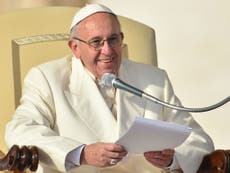The Name of God is Mercy - A Conversation with Andrea Tornielli by Pope Francis; trans. Oonagh Stransky, book review
Pope Francis expounds on mercy - a notion at the heart of Christianity but one that somehow got lost in modern teaching of the faith

When the cardinals of the Catholic Church met in Rome in 2013 to elect a new Pope, they were housed in Casa Santa Marta, the residence where Pope Francis now lives. During the conclave, the German theologian Cardinal Walter Kasper was in a room opposite the Argentine Cardinal Jorge Bergoglio, the man who would be elected Pope. Kasper gave him a copy of his just published book, Mercy: The Essence of the Gospel and the Key to Christian Life. Bergoglio, took it, saying: "Mercy! This is the name of our God!"
He is said to have devoured the book in the days leading up to his election. For mercy had long been a theme of his own teaching, now expounded in this book, whose title is taken from that moment with Kasper. For many Catholics, let alone those outside the church, this notion of mercy being the big idea of Christian teaching might come as a surprise. Isn't this the church, after all, that for generations has wagged its finger at people in disapproval? Isn't its commandment "thou shalt not..?"
Pope Francis gives life advice: in pictures
Show all 10In fact, what Pope Francis has done here is peel back the layers of condemnation and reproof and refashioned Christian teaching. Based on conversations with the Vatican journalist Andrea Tornielli, and through anecdotes from his own life, he explores mercy, the notion that was there all along in Christianity, but somehow got lost. What is still evident in this book, though, is a strong notion of sin. Or to put in more 21st-century language: we're flawed people, and boy, do we screw up.
One of the problems that Pope Francis has noted today is that people often have no sense of mercy being possible, that they don't know that they can be forgiven for their wrongdoing. He wants passionately to counter this. "This is the fragility of the time we live in," he writes, "believing that there is no chance of redemption, a hand to raise you up, an embrace to save you, forgive you, pick you up with infinite, patient indulgent love, to put you back on your feet."
He also attempts to explain what mercy is. Forgiveness is part of it, yes, and compassion too. He writes movingly of the need for people to be compassionate to one another, and lambasts society today for what he calls "the globalisation of indifference", the view that the poor, the homeless, and refugees have no call on us. But mercy is essentially about God's love for people, his divine judgment that is boundless in its generosity. A test of this papal thinking will come this year when Francis publishes his response to two recent synods on marriage and the family where the treatment of divorced and remarried Catholics and gay people was discussed. Catholics the world over will be hoping Francis will make them more welcome. These are issues close to home for him; he writes in the book of his divorced and remarried niece.
For believers, this slim volume will provide a useful exposition of mercy, and the assurance that it is possible to both admit mistakes and move on from them. For those who do not believe, it gives a useful insight into Christian thinking and possibly even more than that. For Francis urges a focus on what Catholics call the corporal works of mercy: to feed the hungry, give drink to the thirsty, clothe the naked, shelter the traveller, comfort the sick, visit those imprisoned, bury the dead. Who could argue with that? As St John of the Cross, whom Francis quotes here, said: "In the evening of life, we will be judged on love alone."
Catherine Pepinster is editor of 'The Tablet'. Her book on the British and the papacy will be published later this year by Bloomsbury
Bluebird, £14.99. Order at £12.99 inc. p&p from the Independent Bookshop
Subscribe to Independent Premium to bookmark this article
Want to bookmark your favourite articles and stories to read or reference later? Start your Independent Premium subscription today.





Join our commenting forum
Join thought-provoking conversations, follow other Independent readers and see their replies
Comments